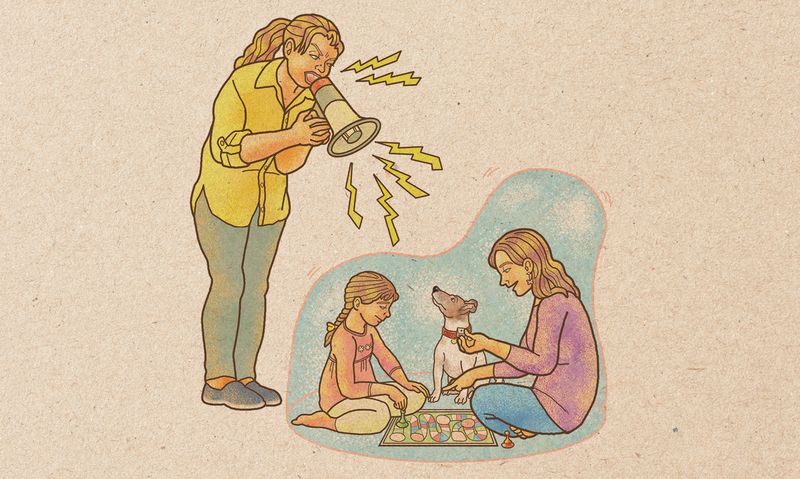18 Toxic Family Habits You Should Stop Calling ‘Normal’
Families are supposed to be our safe havens, yet many foster environments where toxic behaviors masquerade as normal. These habits, often ingrained over generations, are shielded by excuses like tradition or discipline.
It’s crucial to spotlight and challenge these dysfunctions, freeing future generations from their grip and fostering healthier family dynamics. This post uncovers 18 such toxic habits, each demanding scrutiny and change for genuine familial well-being.
1. Calling emotional neglect “tough love”

Tough love often disguises emotional neglect. Many believe withholding affection builds character. In reality, it breeds insecurity and detachment. Parents may think they’re preparing children for harsh realities, but they’re creating emotional voids.
Every denied hug is a missed opportunity for connection. Children need validation, not coldness. Real strength arises from vulnerability, not emotional walls. Challenge this misconception. Embrace warmth and understanding. Foster environments where emotions are celebrated, not stifled.
This shift nurtures resilience. Emotional intelligence thrives when love is abundant. Let compassion be the guiding force. Developing empathetic humans begins at home, with love as the foundation.
2. Expecting kids to handle adult problems

Children shouldn’t bear adult burdens, yet many families thrust responsibilities upon young shoulders. This pressure robs them of innocence and childhood. Children deserve to play and explore, not stress over finances or family issues. Shielding them from adult worries is crucial.
Allow them to experience childhood joys. Discuss issues at their level, but never burden them with solutions. Encourage growth at their pace, not yours.
Protect their dreams from the harshness of reality. This protection fosters confidence and creativity. Let children bloom in their own time, free from undue pressures. Childhood is sacred, deserving of joy and wonder.
3. Forcing forgiveness without accountability

Forgiveness shouldn’t be demanded, especially when accountability is absent. Families often push for resolution without addressing wrongs. True reconciliation requires acknowledging hurt and taking responsibility.
Sweeping issues under the rug only breeds resentment. It’s crucial to create a culture of genuine apologies and understanding. Let healing occur naturally, not through force. This fosters trust and authentic connections. Encourage dialogues where everyone feels heard and valued.
Accountability paves the way for real forgiveness. It’s not about forgetting, but learning and growing together. Families thrive when openness and honesty guide interactions. Break the cycle of forced forgiveness.
4. Using guilt as a form of control

Guilt is a powerful manipulator in family dynamics. When wielded as a weapon, it controls and diminishes. Elders often use guilt to enforce obedience, stifling individuality. Such tactics erode self-esteem and autonomy. Love becomes conditional, tied to compliance.
Challenging this requires asserting boundaries. Recognize guilt tactics and resist. Encourage open conversations about feelings and needs. Validate each family member’s autonomy. Empowerment arises from recognizing personal worth, not succumbing to guilt.
Families should uplift, not diminish. Shift the focus to mutual respect and understanding. Break free from guilt’s grip, fostering genuine connections rooted in love.
5. Shaming emotions as weakness

In many families, emotions are seen as vulnerabilities, not strengths. Tears are met with scorn, laughter with suspicion. This stigma silences emotional expression, fostering repression. Emotions are natural and vital for connection.
They bridge understanding, allowing empathy to flourish. Embrace emotional authenticity. Celebrate tears, laughter, and everything between. Teach children that emotions are human, not flaws. Create spaces where feelings are welcomed, not judged. This nurtures mental well-being. Encourage emotional literacy, recognizing and articulating feelings.
Families should be sanctuaries for authentic expression. Break the silence surrounding emotions. Let empathy guide interactions, fostering deeper, more meaningful connections.
6. Belittling instead of guiding

Guidance, not ridicule, should shape family interactions. Belittling remarks erode confidence and hinder growth. Children flourish under encouragement, not mockery. Words have power; use them wisely. Shift focus from criticism to support.
Embrace mistakes as learning opportunities. Constructive feedback fosters development. Encourage curiosity and exploration. Families should build, not break. Nurture dreams with kindness and understanding. Recognize each person’s potential. Celebrate efforts, not just successes.
This transforms family dynamics, creating environments where everyone thrives. Empower through affirmation, not insults. Let encouragement be the family language. Inspire growth with compassion, helping each member reach their fullest potential.
7. Prioritizing appearances over well-being

Appearing perfect often trumps genuine well-being in families. The facade of harmony masks underlying turmoil. Prioritizing appearances denies authentic connection. True happiness stems from within, not external validation.
Families should focus on emotional health over external perceptions. Encourage open conversations about struggles and triumphs. Create environments where authenticity thrives. Challenge the notion that image is everything. Real connections arise from vulnerability and honesty.
Shift focus from how families look to how they feel. Nurture mental and emotional well-being. Let go of perfection, embracing authenticity. Families flourish when well-being, not appearances, guides interactions. Break the cycle of superficiality.
8. Punishing boundaries as disrespect

Boundaries are essential, yet many families view them as rebellion. Respecting boundaries fosters trust and mutual respect. When punished, it teaches compliance over autonomy. Encourage family members to express limits without fear. Open dialogue about boundaries strengthens relationships.
Recognize that asserting boundaries isn’t defiance, but self-awareness. Families should celebrate individuality, not suppress it. Encourage healthy discussions about needs and limits. This nurtures understanding and respect. Let boundaries be bridges, not barriers.
Foster environments where everyone feels safe to express themselves. Challenge the idea that boundaries undermine authority. Embrace them as vital components of healthy relationships.
9. Competing with your children

Families should uplift, not compete. Parents often see children as extensions, not individuals. This fosters unhealthy competition. Celebrate achievements without comparison. Encourage individual growth paths. Recognize each person’s unique talents.
Competition breeds resentment, hindering connection. Shift focus from rivalry to support. Celebrate successes together, fostering joy and unity. Encourage collaboration, not competition. Recognize that family isn’t a race, but a journey.
Embrace each member’s journey without overshadowing. Families thrive when support, not rivalry, guides interactions. Break the cycle of competition, nurturing environments where everyone feels valued and respected. Let love, not competition, be the guiding force.
10. Holding grudges like family heirlooms

Grudges linger like shadows in families, casting gloom over interactions. Holding onto past hurts prevents healing. Recognize that forgiveness liberates. Families must learn to let go, embracing growth. Grudges stifle joy, hindering connection.
Encourage open dialogues about pain and resolution. Let the past inform, not dictate, the present. Families thrive on understanding and compassion. Shift focus from resentment to renewal. Recognize the power of letting go.
Embrace each new day as an opportunity for healing. Families should be sanctuaries, not battlegrounds. Break free from the chains of grudges, fostering environments where forgiveness and growth flourish.
11. Making love conditional on obedience

Conditional love constrains family dynamics. When love depends on obedience, it becomes transactional. Authentic connection requires acceptance, not conditions. Families should nurture unconditional love, embracing imperfections.
Love flourishes when freely given, not earned. Encourage bonds based on trust and mutual respect. Recognize each person’s worth beyond compliance. Shift focus from conditions to connections. Celebrate individuality and uniqueness.
Families thrive on authentic love, fostering environments where everyone feels valued. Break the cycle of conditional love, letting acceptance guide interactions. Embrace love as a constant, not a reward. Let family be a haven of unconditional care and support.
12. Laughing off cruel comments as “jokes”

Cruel jokes mask underlying truths. Families often dismiss hurtful remarks as humor. Recognize that words wound, even when laughter follows. Families should foster respect, not ridicule. Encourage communication about feelings and impact. Shift focus from humor to kindness.
Recognize the power of language to heal or harm. Create environments where everyone feels safe and respected.
Challenge the notion that humor excuses cruelty. Let empathy guide interactions. Families thrive on understanding and compassion. Break free from the cycle of hurt disguised as jokes. Embrace humor that uplifts, not diminishes. Celebrate connections built on respect and love.
13. Gaslighting instead of apologizing

Gaslighting erodes trust within families. When apologies are replaced with denial, confusion reigns. Recognize the harm of gaslighting. Families should prioritize honesty and accountability. Encourage open dialogues about feelings and perceptions.
Create environments where truth is valued. Shift focus from denial to understanding. Recognize the power of genuine apologies to heal wounds. Families thrive on transparency and trust. Break free from the cycle of gaslighting. Embrace honesty as the foundation of interactions.
Let family be a space where everyone feels heard and validated. Challenge the notion that denying reality strengthens bonds. Embrace truth, nurturing authentic connections.
14. Ignoring mental health struggles

Mental health is crucial, yet often overlooked in families. Ignoring struggles worsens issues, isolating individuals. Recognize mental well-being as vital. Encourage open conversations about feelings and mental health. Create environments where seeking help is normalized. Shift focus from stigma to support.
Recognize the importance of mental health discussions. Families should be allies, not adversaries. Break free from the silence surrounding mental health.
Embrace understanding and empathy. Let family be a haven of support and acceptance. Recognize that addressing mental health strengthens bonds. Encourage environments where everyone feels valued and supported. Challenge the notion that mental health struggles define worth.
15. Using silence as a weapon

Silence speaks volumes in family dynamics. When used as a weapon, it creates barriers. Recognize the harm of silent treatment. Families should prioritize communication over isolation. Encourage open dialogues about issues and feelings. Shift focus from silence to understanding.
Recognize the power of words to heal. Create environments where everyone feels safe to express themselves. Break free from the cycle of silence. Embrace connection and empathy. Let family be a space of open communication.
Challenge the notion that silence resolves conflicts. Embrace dialogue, fostering environments where everyone feels heard and understood. Families thrive on communication and connection.
16. Rewarding silence over truth

Silence is often rewarded in families, stifling truth. Recognize the harm of valuing silence over honesty. Families should foster environments where truth is celebrated. Encourage open dialogues about feelings and experiences. Shift focus from silence to authenticity.
Recognize the power of truth to build trust. Create spaces where honesty thrives. Break free from the cycle of rewarded silence. Embrace transparency and understanding. Let family be a haven of truth and acceptance. Celebrate connections built on honesty and respect.
Challenge the notion that silence strengthens bonds. Embrace truth as the foundation of interactions. Families thrive on authenticity.
17. Blaming one person for everything

Scapegoating harms family dynamics. When one person bears blame, resentment festers. Recognize the harm of blaming. Families should foster unity, not division. Encourage understanding and shared responsibility.
Shift focus from blame to collaboration. Recognize the power of collective problem-solving. Create environments where everyone feels valued. Break free from the cycle of blame. Embrace empathy and cooperation. Let family be a space of support and understanding.
Challenge the notion that one person is at fault. Embrace collaboration, fostering environments where everyone feels included. Families thrive on unity and shared goals. Recognize the strength in togetherness and mutual support.
18. Making loyalty more important than safety

Loyalty is revered in families, but safety should come first. Recognize the harm of prioritizing loyalty over well-being. Encourage environments where safety is paramount. Shift focus from blind loyalty to informed decisions. Recognize the importance of individual well-being.
Families should prioritize health and safety over allegiance. Break free from the cycle of misplaced loyalty. Embrace understanding and informed choices. Let family be a haven of safety and support. Challenge the notion that loyalty is paramount.
Embrace decisions grounded in well-being. Families thrive on safety and care. Recognize the strength in prioritizing health, fostering environments where everyone feels secure and valued.







